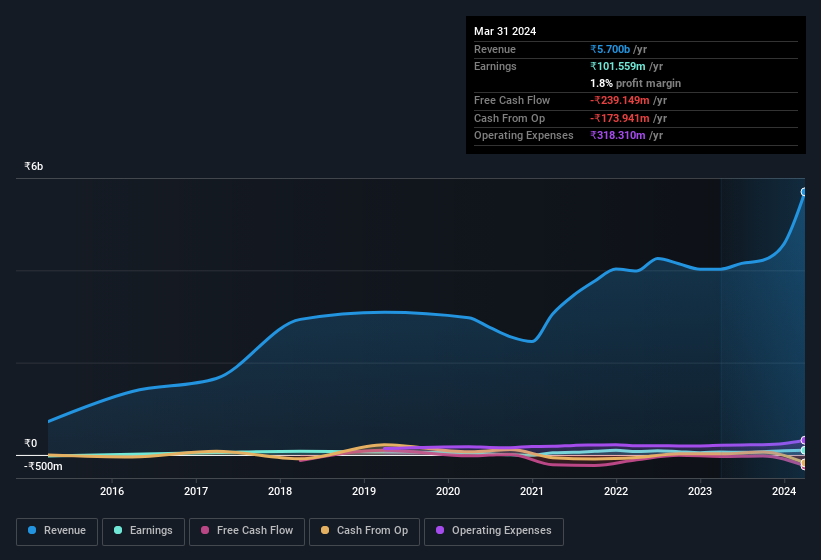- India
- /
- Electronic Equipment and Components
- /
- NSEI:WEL
Investors Shouldn't Be Too Comfortable With Wonder Electricals' (NSE:WEL) Earnings
Unsurprisingly, Wonder Electricals Limited's (NSE:WEL) stock price was strong on the back of its healthy earnings report. However, our analysis suggests that shareholders may be missing some factors that indicate the earnings result was not as good as it looked.
View our latest analysis for Wonder Electricals

Zooming In On Wonder Electricals' Earnings
Many investors haven't heard of the accrual ratio from cashflow, but it is actually a useful measure of how well a company's profit is backed up by free cash flow (FCF) during a given period. To get the accrual ratio we first subtract FCF from profit for a period, and then divide that number by the average operating assets for the period. This ratio tells us how much of a company's profit is not backed by free cashflow.
Therefore, it's actually considered a good thing when a company has a negative accrual ratio, but a bad thing if its accrual ratio is positive. While it's not a problem to have a positive accrual ratio, indicating a certain level of non-cash profits, a high accrual ratio is arguably a bad thing, because it indicates paper profits are not matched by cash flow. That's because some academic studies have suggested that high accruals ratios tend to lead to lower profit or less profit growth.
For the year to March 2024, Wonder Electricals had an accrual ratio of 0.29. Therefore, we know that it's free cashflow was significantly lower than its statutory profit, raising questions about how useful that profit figure really is. In the last twelve months it actually had negative free cash flow, with an outflow of ₹239m despite its profit of ₹101.6m, mentioned above. We also note that Wonder Electricals' free cash flow was actually negative last year as well, so we could understand if shareholders were bothered by its outflow of ₹239m.
Note: we always recommend investors check balance sheet strength. Click here to be taken to our balance sheet analysis of Wonder Electricals.
Our Take On Wonder Electricals' Profit Performance
Wonder Electricals' accrual ratio for the last twelve months signifies cash conversion is less than ideal, which is a negative when it comes to our view of its earnings. Therefore, it seems possible to us that Wonder Electricals' true underlying earnings power is actually less than its statutory profit. But at least holders can take some solace from the 38% per annum growth in EPS for the last three. Of course, we've only just scratched the surface when it comes to analysing its earnings; one could also consider margins, forecast growth, and return on investment, among other factors. If you want to do dive deeper into Wonder Electricals, you'd also look into what risks it is currently facing. Case in point: We've spotted 3 warning signs for Wonder Electricals you should be aware of.
Today we've zoomed in on a single data point to better understand the nature of Wonder Electricals' profit. But there are plenty of other ways to inform your opinion of a company. For example, many people consider a high return on equity as an indication of favorable business economics, while others like to 'follow the money' and search out stocks that insiders are buying. While it might take a little research on your behalf, you may find this free collection of companies boasting high return on equity, or this list of stocks with significant insider holdings to be useful.
Valuation is complex, but we're here to simplify it.
Discover if Wonder Electricals might be undervalued or overvalued with our detailed analysis, featuring fair value estimates, potential risks, dividends, insider trades, and its financial condition.
Access Free AnalysisHave feedback on this article? Concerned about the content? Get in touch with us directly. Alternatively, email editorial-team (at) simplywallst.com.
This article by Simply Wall St is general in nature. We provide commentary based on historical data and analyst forecasts only using an unbiased methodology and our articles are not intended to be financial advice. It does not constitute a recommendation to buy or sell any stock, and does not take account of your objectives, or your financial situation. We aim to bring you long-term focused analysis driven by fundamental data. Note that our analysis may not factor in the latest price-sensitive company announcements or qualitative material. Simply Wall St has no position in any stocks mentioned.
About NSEI:WEL
Wonder Electricals
Engages in the manufacture and supply of ceiling, exhaust, pedestal, and TPW and BLDC fans in India.
Solid track record with mediocre balance sheet.
Market Insights
Community Narratives



